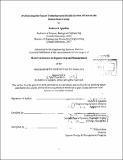| dc.contributor.advisor | Jayakanth Srinivasan. | en_US |
| dc.contributor.author | Ippolito, Andrea K. (Andrea Katherine) | en_US |
| dc.contributor.other | Massachusetts Institute of Technology. Engineering Systems Division. | en_US |
| dc.date.accessioned | 2013-07-10T14:51:42Z | |
| dc.date.available | 2013-07-10T14:51:42Z | |
| dc.date.copyright | 2012 | en_US |
| dc.date.issued | 2012 | en_US |
| dc.identifier.uri | http://hdl.handle.net/1721.1/79523 | |
| dc.description | Thesis (S.M.)--Massachusetts Institute of Technology, Engineering Systems Division, 2012. | en_US |
| dc.description | Cataloged from PDF version of thesis. | en_US |
| dc.description | Includes bibliographical references (p. 151-159). | en_US |
| dc.description.abstract | Charged by the Chairman of the Joints Chief of Staff, the authors were members of a study to develop innovative recommendations for transforming the military enterprise to better manage post-traumatic stress and related conditions in support of service members and their families. The authors first began their study by performing a stakeholder analysis to understand the unmet needs of stakeholders across the enterprise. By assessing stakeholder values across the life cycle, we found that there was a strong need to improve the continuity of care and accessibility of services for service members and their families, in particular for the Reserve Component and National Guard population. Therefore, the authors investigated the role of technology to serve as a force extender to improve access and timeliness of care to psychological health care services. Specifically, they utilized a systems approach to evaluate the current state of telehealth within the Military Health System. By utilizing the enterprise lenses of strategy, policy, organization, services, processes, infrastructure, and knowledge to analyze the current state of telebehavioral health, they proposed a future state architecture for telehealth delivery. They highlight seven enterprise requirements for developing this future state architecture: 1. MEDCOM shall establish a core funding stream as a line item to support TH service line. 2. MEDCOM Telehealth Service line shall develop standard TBH metrics for deployment across the enterprise 3. MEDCOM Telehealth Service line shall identify eligible populations across the enterprise that could benefit from the expanded access that TBH services provide. 4. MEDCOM Telehealth Service line shall develop an enterprise solution that supports seamless flow of operational information and the electronic health record. 5. MEDCOM Telehealth Service line shall revisit specific policies that are presenting barriers to telehealth growth and sustainability. 6. MEDCOM Telehealth Service line shall encourage learning and best practice sharing across the Army TH enterprise. 7. MEDCOM Telehealth Service line shall collaborate with other Army governance organizations to develop a mobile health strategy and pilot projects for the Army enterprise. | en_US |
| dc.description.statementofresponsibility | by Andrea K. Ippolito. | en_US |
| dc.format.extent | 159 p. | en_US |
| dc.language.iso | eng | en_US |
| dc.publisher | Massachusetts Institute of Technology | en_US |
| dc.rights | M.I.T. theses are protected by
copyright. They may be viewed from this source for any purpose, but
reproduction or distribution in any format is prohibited without written
permission. See provided URL for inquiries about permission. | en_US |
| dc.rights.uri | http://dspace.mit.edu/handle/1721.1/7582 | en_US |
| dc.subject | Engineering Systems Division. | en_US |
| dc.title | Architecting the future telebehavioral health system of care in the United States Army | en_US |
| dc.title.alternative | Architecting the future telebehavioral health system of care in the Army | en_US |
| dc.type | Thesis | en_US |
| dc.description.degree | S.M. | en_US |
| dc.contributor.department | Massachusetts Institute of Technology. Engineering Systems Division | |
| dc.identifier.oclc | 849894390 | en_US |
